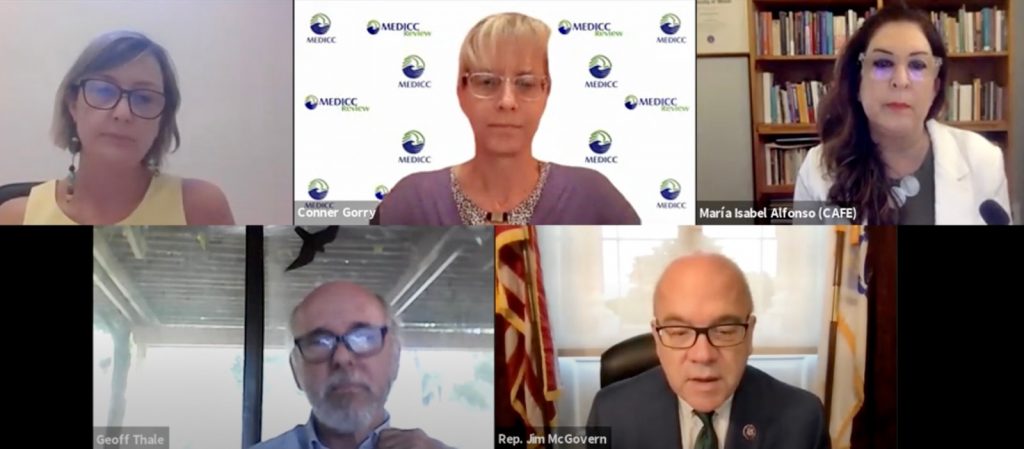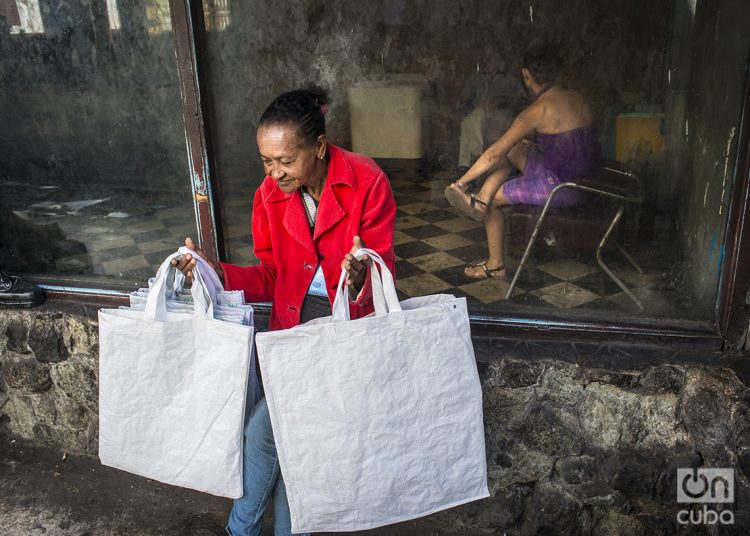The panel “The Impact of U.S. Sanctions on Cuban Women,” which featured presentations by Elena Gentili, representative of the Oxford Committee for Famine Relief (OXFAM) in Cuba, Conner Gorry, editor of Medical Education Cooperation with Cuba (MEDICC), María Isabel Alfonso, coordinator of Cuban Americans for Engagement (CAFE), and Geoff Thale, president of the Washington Office on Latin America (WOLA), was held on June 22. The panel coordinators were Stephanie Burgos, deputy director of the government affairs section of OXFAM-America, Jorge Quintana, executive director of the Center for the Democracy in the Americas (CDA), and Geoff Thale (WOLA).
The keynote remarks were delivered by U.S. Congressman Jim McGovern (Dem-MA 2nd District), who has a long history of advocating for the lifting of the embargo.

The publication of Right to Live Without a Blockade, an OXFAM report from May 2021, preceded this meeting. Both the document and the panel seek to make visible the amplified impact of the U.S. economic sanctions on women and the most vulnerable groups on the island within the specific context of the pandemic. The Zoom event also preceded the United Nations General Assembly vote on June 23 for a resolution in favor of lifting the embargo, which was supported by 184 countries, and which the United States opposed.
The event emphasized the comprehensive and demoralizing nature of the embargo, which affects both public and private spaces on the island, in areas as dissimilar as access to technology and the capacity and management of care. Increased during the Trump administration, the sanctions reproduce the status quo of a patriarchal system in which women and the most vulnerable groups are most affected.
This does not mean that women are the only ones affected. Sanctions hurt both women and men and other demographic groups. However, they have an impact by accentuating pre-existing gender inequality gaps.
OXFAM has been focusing for years on the empowerment of women and on the constructive analysis of gender inequalities on the island. The organization thus occupies a privileged position to detect the degrees of intensity with which sanctions affect this population group. The report illustrates the peculiarities of such incidents and demands the right to live a dignified life in which an attitude of resistance and survival is not constantly present.
Cuban women are in a situation of greater vulnerability given the high level of professionalization of this group but the existence of patriarchal structures that still dominate gender dynamics on the island: on the one hand, women occupy a high percentage of the country’s labor force; on the other, they continue to play a leading role in domestic and care tasks.
The pandemic does not discriminate; inequalities do: women cushioning the crisis
This is compounded by the confinement situation caused by the pandemic. For example, as some of the care services previously subsidized by the state have been temporarily displaced to the private area due to the pandemic, it is now women who generally take care of providing support, on a non-remunerated basis, to other vulnerable sectors such as children and the elderly. It is also fair to mention that women, according to the OXFAM report, occupy 71% of medical services, which makes them more vulnerable to contagion by COVID-19.
Platforms and civil society groups have also detected an increase in femicides and cases of domestic abuse, triggered by the confinement that the pandemic entails. These situations are not unique to Cuba, but the context of sanctions that prevent the arrival of remittances and flights to the island, have a negative impact on Cuban women’s autonomy, mobility and activities.
On the other hand, the shortage of medicines, from the most basic to the most specialized, affects the elderly and those with chronic diseases more strongly. That sanctions even interfere with humanitarian donations to prevent the spread of the virus is perhaps the most striking example of their cruelty.
Both the panelists and the report acknowledged that it is not all the fault of the embargo. There are obstacles in the internal development of the nation that do not depend on it. In the case of CAFE, we also emphasize the need for the Cuban government to adopt human rights standards in terms of guaranteeing political freedoms that make way for a more inclusive and plural civil society.
How do the sanctions affect the Cuban-American community?
As a representative of CAFE, an organization that since its foundation has focused on the problems that affect the Cuban-American community, I exposed the circumstances that Cuban-American women and families are going through after the tightening of sanctions by the Trump administration.
The concept of extended family occupies a central place in Cuban and Cuban-American identity. Within this paradigm, sanctions have an amplified effect since many times a family from the United States provides not only for its immediate nucleus (mother, father, children, grandparents), but also for its extended family (cousins, uncles, etc.).
Cuban-American women are an important and essential part of this support structure that, through remittances and trips, seeks to alleviate the crisis situation that their counterparts and the rest of the Cubans are going through on the island. They also receive a greater impact in this context since, added to the circumstances of confinement and the doubling of responsibilities in private and public spaces, they also carry on the shoulders the weight of their relatives in Cuba.
Four of the sanctions imposed by Trump have a particularly devastating effect: the ban on remittances via Western Union, the closure of the embassy, the subsequent freeze of the family reunification program, and the cancellation of flights to the provinces. The current cost of sending money to freely convertible currency cards is outrageous. Those who send are, in many cases, women and older people who, from the outset, have fewer resources, either due to the well-known disparity in wages to a disadvantage for women, or because many of the older people live in a situation of economic dependency.
Added to this real, palpable impact there’s the emotional and psychological. Those of us who came to the United States in search of an improvement in our living conditions, whether in the economic area, or rights and freedoms, or simply in both aspects, are conditioned to new violations by having to depend on a state that regulates our movements and decisions, having an impact on areas that are as personal as family dynamics.
The effect of collective anxiety that this creates is no small thing. Previous governments, like that of G.W. Bush, with a clearly intrusive character, have dictated to the Cuban-American community when and how we can travel, as well as the amount of money we can send to our families, and how often we can do so. The lengths Trump went to in eliminating the only solid way we had to provide remittances is downright outrageous. Such regulations restrict our freedoms as Cuban-American citizens since, in addition to aggravating the situation of our relatives on the island, they limit constitutional rights of those of us who collaborate with taxes, work, and good citizen behavior, to the common good of our adoptive nation.
Cuban government: U.S. embargo causes losses of 9.157 billion between 2019 and 2020
Resizing the tunnel vision of human rights
The Biden administration has said on several occasions that its Cuba policy will be based on two basic principles: the promotion of human rights and the consideration of Cuban Americans and Americans as the best ambassadors of American values.
CAFE recommends a reassessment of these principles from a comprehensive and contextualized perspective.
First, it is necessary to abandon the tunnel vision that has characterized the promotion of human rights on the island by this and other administrations. A human rights policy that seeks to ensure guarantees of political freedoms to a group at the cost of limiting access to basic resources such as food and medicine for a majority is simply not a good human rights policy. There is no data that the majority of the Cuban people support the San Isidro Movement or endorse all its claims. On the contrary, there is evidence that people are desperate, that the queues in the middle of a pandemic can create an epidemiological crisis (not to mention the stress and weakening they cause), and that the sick urgently need medicines that are in short supply.
On the other hand, we insist that an environment of hostility towards Cuba does not guarantee greater observance of human rights. On the contrary, isolation ensures the radicalization of the most orthodox sectors and the reproduction of more violations.
One way to clear this policy of hostility is to begin to recognize areas of success on the other side, however minimal. Compared to the undeniable tightening in recent times of the siege against sectors of the opposition, there are advances that seem to have no rolling back, such as Cubans’ access to the Internet, the rights of the LGBTQ community, economic reforms, and religious freedoms, among others. An acknowledgment of these important areas of progress can be a first step to much-needed détente.
Retaking intergovernmental collaboration treaties is another way of fostering a new rapprochement and, at the same time, promoting a policy based on an extensive vision of human rights. The health area is ideal for this. The success of Cuban scientists with the production of the COVID-19 vaccines demonstrates once again that Cuban researchers have the professional stature and inventiveness necessary to establish solid cooperation in this area with the United States.
There are already examples that attest to the potential success of this type of collaboration. The Center for Molecular Immunology in Havana has developed several cancer therapies, including CimaVax, a lung cancer vaccine, whose clinical studies are being funded by the Roswell Park Institute in New York. Cases like these should be the norm and not the exception.
CAFE has made it clear on multiple occasions that it opposes arbitrary arrests of dissidents, defamatory television campaigns against the opposition, and other manifestations of violence due to political differences. We have had no problem communicating this to the government of the island in our successive visits to the embassy in Washington and other dialogue scenarios in which we have had the opportunity to talk in a civilized manner. The government of the Biden administration, for its part, must understand that in Cuba not everyone is a dissident, and that sacrificing the basic rights of 11 million to guarantee freedoms to a sector of Cuban civil society is not a good human rights policy.
Likewise, it is not understood that the president believes that we are the best ambassadors of American values and that at the same time he limits our travel freedoms. How are we supposed to convey those values? The reopening of trips, as well as consular services and imminently, remittances, as well as the restoration of a general license for people-to-people trips, are the best way to ensure a free exchange of ideas for the benefit of both communities. The president is not dependent on Congress to restore such regulations. What is he you waiting for?
We, for our part, hope that the panel has made visible the human and real dimensions of the sanctions.
We are not naive about the way politics works in the United States. We know that on many occasions it is electoral dynamics, and not a true concern for rights, that unfortunately guide foreign policy agendas.
It is our responsibility, however, to draw attention to the need for an imminent rearrangement of focuses and priorities, not only from a moral perspective but also from one of realpolitiks. Ultimately, a negligent policy leading to an immigration crisis could cost Biden the re-election he so seeks to secure. More than that, it would make him go down in history as the president who caused a disproportionately negative impact on women, children, the sick, the elderly, and other vulnerable populations in Cuba with a policy inherited from the previous administration.










